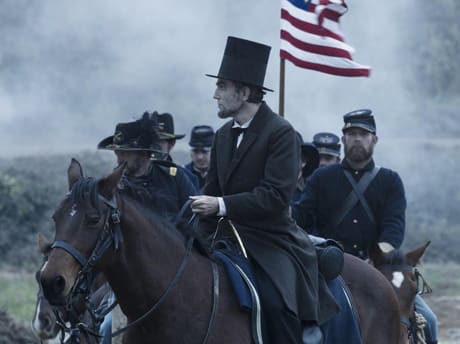It's not a coincidence that Spielberg's overwhelmingly didactic and expository, cinematically limited, biopic about Abraham Lincoln and the democratic process involved in abolishing slavery coincides with the U.S. Election.
If Obama is re-elected ― noting that Spielberg and DreamWorks Animation CEO Jeffrey Katzenberg just dumped a sizable donation in his camp ― the liberal media and most of the literate world can rejoice in the importance of willpower and democracy in fighting bigotry and the fear of change. Should he lose, then Lincoln works as a damning admonitory.
For anyone with even a broad knowledge of U.S. history, this pedantic, bloated and self-important reiteration of Lincoln's (Daniel Day Lewis) most significant contribution ― the Emancipation Proclamation ― may view as a particularly dry television biography. Although, as written by Tony Kushner (Angels in America), the inflated verbosity and overbearing sense of sanctimony make it prime for cloying, heavy-handed manipulation, as trademarked by the ever-patronizing Spielberg.
As stated early, Lincoln's achievements came in his second term (nudge, nudge) and required steadfast determination and focus. Working primarily with his Secretary of State (David Strathairn) and more reluctantly with the surly and pragmatic Thaddeus Stevens (Tommy Lee Jones), Lincoln had to slip abolitionism into an amendment promoted as a method to stop the ongoing Civil War.
With the occasional draining monologue from Mary Todd Lincoln (Sally Field) or quaint metaphorical story from Lincoln, this entirely dialogue-driven story proceeds to detail the endless manipulative power tactics and exploitive means Lincoln's camp used to get the 13th amendment through congress.
Everything else is just defensive justification for using shady means to gain a valuable outcome (although, how might we perceive it if someone used the same tactics to promote slavery?), as framed with humourless, self-righteous low angle shots that close in on a character, with a swelling score in the background, every time they say something progressive or historical.
Unintentionally laughable, this plodding, self-serving work of transparency works better as a drinking game. Every time someone says, "Abolition," or Lincoln tells a story, or someone says something racist, or Spielberg uses an ungracious heavy hand, you take a drink. It'll make insults like, "You fatuous nincompoop," that much more amusing.
(Buena Vista)If Obama is re-elected ― noting that Spielberg and DreamWorks Animation CEO Jeffrey Katzenberg just dumped a sizable donation in his camp ― the liberal media and most of the literate world can rejoice in the importance of willpower and democracy in fighting bigotry and the fear of change. Should he lose, then Lincoln works as a damning admonitory.
For anyone with even a broad knowledge of U.S. history, this pedantic, bloated and self-important reiteration of Lincoln's (Daniel Day Lewis) most significant contribution ― the Emancipation Proclamation ― may view as a particularly dry television biography. Although, as written by Tony Kushner (Angels in America), the inflated verbosity and overbearing sense of sanctimony make it prime for cloying, heavy-handed manipulation, as trademarked by the ever-patronizing Spielberg.
As stated early, Lincoln's achievements came in his second term (nudge, nudge) and required steadfast determination and focus. Working primarily with his Secretary of State (David Strathairn) and more reluctantly with the surly and pragmatic Thaddeus Stevens (Tommy Lee Jones), Lincoln had to slip abolitionism into an amendment promoted as a method to stop the ongoing Civil War.
With the occasional draining monologue from Mary Todd Lincoln (Sally Field) or quaint metaphorical story from Lincoln, this entirely dialogue-driven story proceeds to detail the endless manipulative power tactics and exploitive means Lincoln's camp used to get the 13th amendment through congress.
Everything else is just defensive justification for using shady means to gain a valuable outcome (although, how might we perceive it if someone used the same tactics to promote slavery?), as framed with humourless, self-righteous low angle shots that close in on a character, with a swelling score in the background, every time they say something progressive or historical.
Unintentionally laughable, this plodding, self-serving work of transparency works better as a drinking game. Every time someone says, "Abolition," or Lincoln tells a story, or someone says something racist, or Spielberg uses an ungracious heavy hand, you take a drink. It'll make insults like, "You fatuous nincompoop," that much more amusing.




